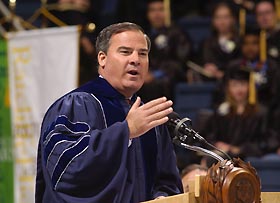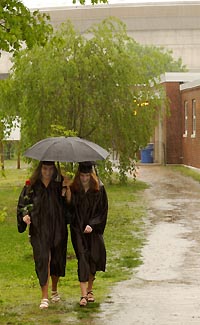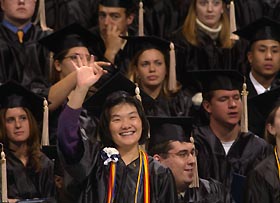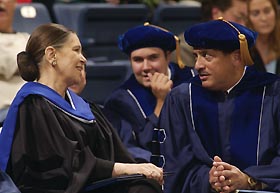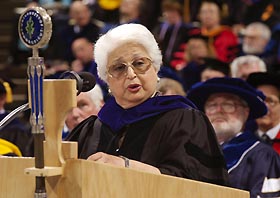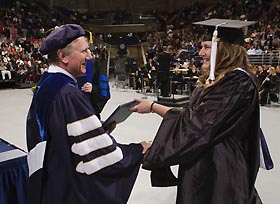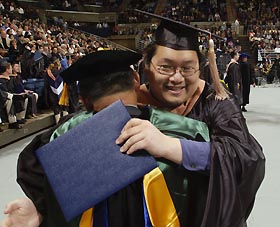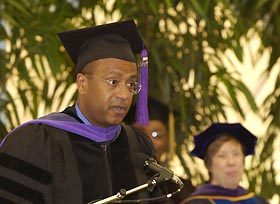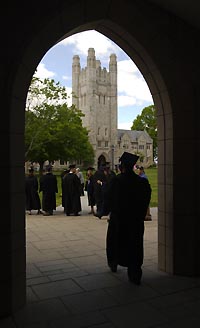|
This is an archived article.
For the latest news, go to the Advance
Homepage
For more archives, go to the Advance Archive/Search Page. |
||||||||||||||||||
|
Governor
Rowland Urges Graduates
To Take Responsibility for Actions By Elizabeth Omara-Otunnu, Allison Thompson & Pat Keefe Members of the Class of 2002 are unlikely to forget that, although the academic year ended in the triumph of their successful graduation, it began with tragedy. Amid the congratulations and exhortations that traditionally characterize the Commencement ceremonies, many of the speakers also struck a solemn note, as they reflected on the multiple ramifications of Sept. 11. Undergraduate
Ceremony He said taking responsibility for our own actions is the core of what makes us human beings. "If we make mistakes, let's ask for forgiveness," Rowland said, "rather than making excuses." He noted that in the weeks and months after Sept. 11, many people showed kindness toward others. But, as time has passed, "we have fallen back to our old ways." "Sept. 11 was an incredible wake-up call for America," the governor added.
He said when he called each of the 120 Connecticut families who lost family members in the tragedy, many spoke of the outpouring of support from strangers. "But it was so sad, when they talked about strangers. Unfortunately those strangers were their neighbors." This reflects a huge shift in society in the past 20 years, he commented. "We need to reflect on how we can rededicate ourselves to getting back to some of the basics." The hope lies in the younger generation, said Rowland. Describing the graduates as a "sea of promise", he said: "I wonder which one of you will be the next governor of the state of Connecticut 20 years from now, which one of you will patent the invention that takes us beyond computers, and which one of you will develop the next life-saving measure." Such achievements, he added, will rest on the choices each one makes every day. More than 3,500 students received bachelor's degrees May 18. The class representatives were Irene Choi, an accounting major, who spoke at the morning ceremony, and Leslie Horner, a double major in history and political science, who spoke in the afternoon. Honorary degrees were awarded to: Princess Irene of Greece (doctor of humane letters); Bobbie Ann Mason, novelist and short story writer (doctor of letters); Joseph Volpe, general manager of the Metropolitan Opera (doctor of fine arts); William Wulf, president of the National Academy of Engineering (doctor of science). University Scholar Tara Bernen and University Teaching Fellow Richard Clark of the College of Agriculture and Natural Resources were also honored, and David Gavitt, founder of the Big East conference, received the University Medal. Graduate
Ceremony She pointed out the implications of prejudice and poverty, and suggested lessons to be learned from the experience of South Africa. "Racism is not only a black-white issue, and religious and other forms of intolerance can have devastating consequences," she noted. "The emergence of political leaders in Australia and Europe who are invoking racism and promoting xenophobia as solutions to genuine economic and social problems must raise concern among all of us." She said that despite many years of institutionalized racism, South Africa - now an emerging democracy - has pursued not vengeance or retribution, but the goal of an inclusive society. She noted that in South Africa and elsewhere, race and poverty are intertwined. "However, amongst South Africans there is a growing realization that our futures are interdependent and that poverty and material inequality needs to be addressed if we are to live in peace," she said. "Our inequalities (in South Africa) are mirrored in the international community," she added. "The income gap between the poorest and richest people and countries has continued to grow. Apart from the humanitarian concern, such disparities endanger international peace and security and are not in the long-term interests of any nation." Ginwala said the history of South Africa demonstrated "that prosperity could not endure in a sea of poverty; that inequality and injustice, however reinforced by modern weapons of war, could not prevail against a people's determination to be free; and that those who build ever higher walls or stronger prison bars succeed only in imprisoning themselves. "There is a need to re-examine the 'global village'," she said, "and redefine it as a global community. For a genuine sense of community brings with it an acknowledgement and recognition of the interdependence of its members, both the powerful and the disempowered." The University honored Ginwala with an honorary doctor of laws degree for her accomplishments in the cause of human rights. Fujia Yang, a physicist and chancellor of the University of Nottingham, U.K., also received an honorary doctor of science degree. Nearly 1,200 students received master's degrees, and 238 received their Ph.D. degree. A further 66 received the doctor of pharmacy degree; 41 diplomas in professional education were awarded, as well as 30 associate's degrees in the two-year Ratcliffe Hicks School of Agriculture. Four recipients of the Chancellor's Research Awards were also recognized: Richard Bass (mathematics), Juha Javanainen (physics), Joel Kupperman (philosophy), and Joseph McKenna (mathematics). School of Law "9/11 changed the life of the nation," said Wald, a former judge of the international criminal tribunal for the former Yugoslavia and retired chief judge of the U.S. Court of Appeals for the District of Columbia, during remarks at the Law School commencement on May 19. "Much of what we took for granted before, we cherish now," she said. This generation of lawyers will be responsible for safeguarding society and the law, Wald said: "However our post-9/11 society evolves, you as lawyers will play a central role." Despite the fact that we don't control as much as we thought, Wald encouraged the students to be engaged, and to make time to work for causes they believe in. "Individuals do count, no matter how wide the stage or how grand the arena," Wald said. "They make a difference at every level." She left the students with the motto from the Connecticut state seal, which translates to "he who transplants himself, survives." Americans have tended to be legal isolationists, Wald said. She encouraged the students to pursue international work during their career. During the ceremony, 197 students received juris doctor degrees, and 50 earned master of law degrees. Class representatives were Ernest Green Jr. and Tanya Tricia Dorman. Wald received an honorary doctor of laws degree. Health Center Dr. Folkman helped invent the cardiac pacemaker and is recognized as "the father of angiogenesis" - the formation of blood vessels around malignant tumors - an area of investigation that shows promise for the treatment of cancer. Folkman put the practices of medicine and dental medicine in perspective when he said there were more than 25,000 diseases with names, and just under 500 were curable. No one can know everything, he said, and mistakes - even by physicians - are inevitable, since physicians are only human. "Our profession is the only human activity where the attempt to relieve suffering runs the risk of causing suffering," he said. "That risk is always there." He repeated the medical aphorism that there is no substitute for intelligence ... except experience, and noted: "Good clinical judgment comes from having made bad judgment. Good clinical skills come from experience and practice. Folkman and Edmund Pellegrino, a physician and professor emeritus of medicine and medical ethics at Georgetown University Medical Center, received honorary doctor of science degrees. Seventy-eight physicians and 44 dentists received their M.D. and D.M.D. degrees. Janice Hartnett was the student speaker for the medical school, Shawn Zahner spoke for the dental school. Thirty-eight master's in public health degrees were awarded, as were several combined degrees and a doctorate in the biomedical sciences. |
